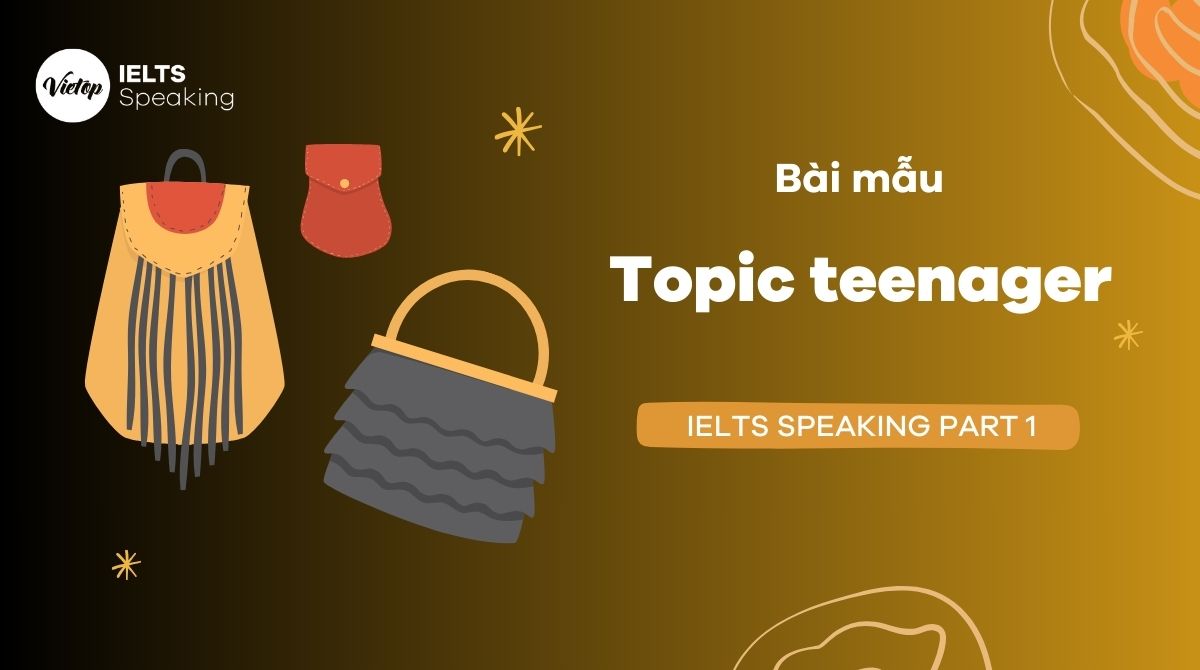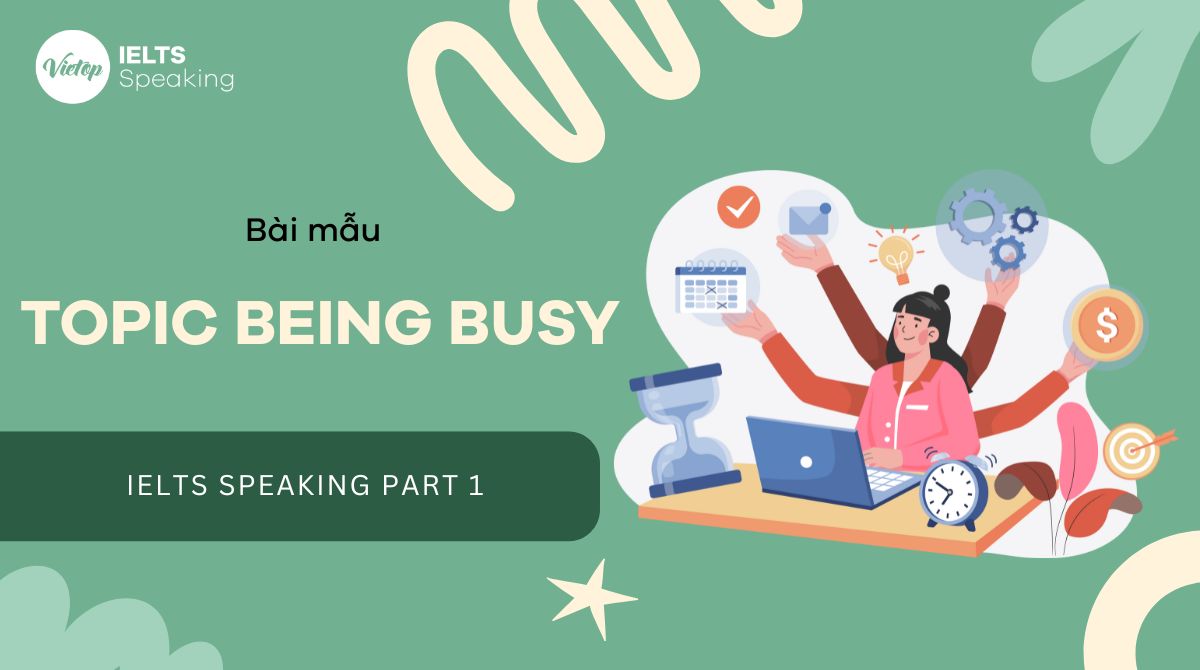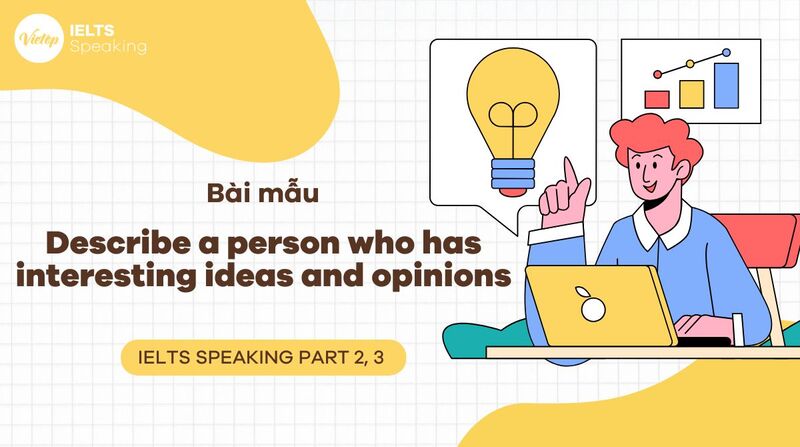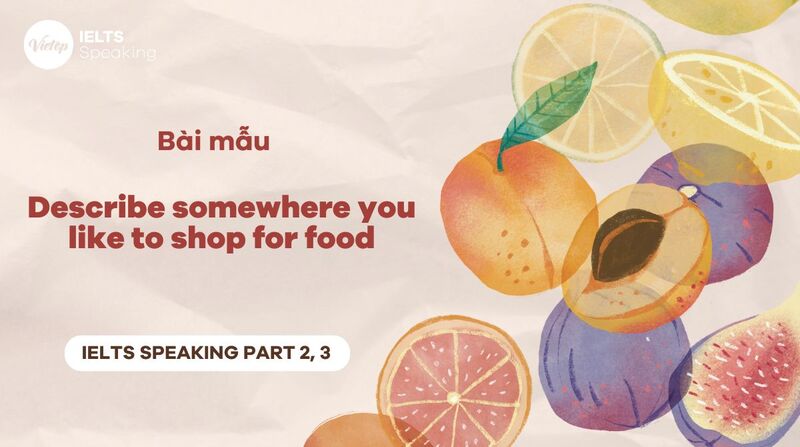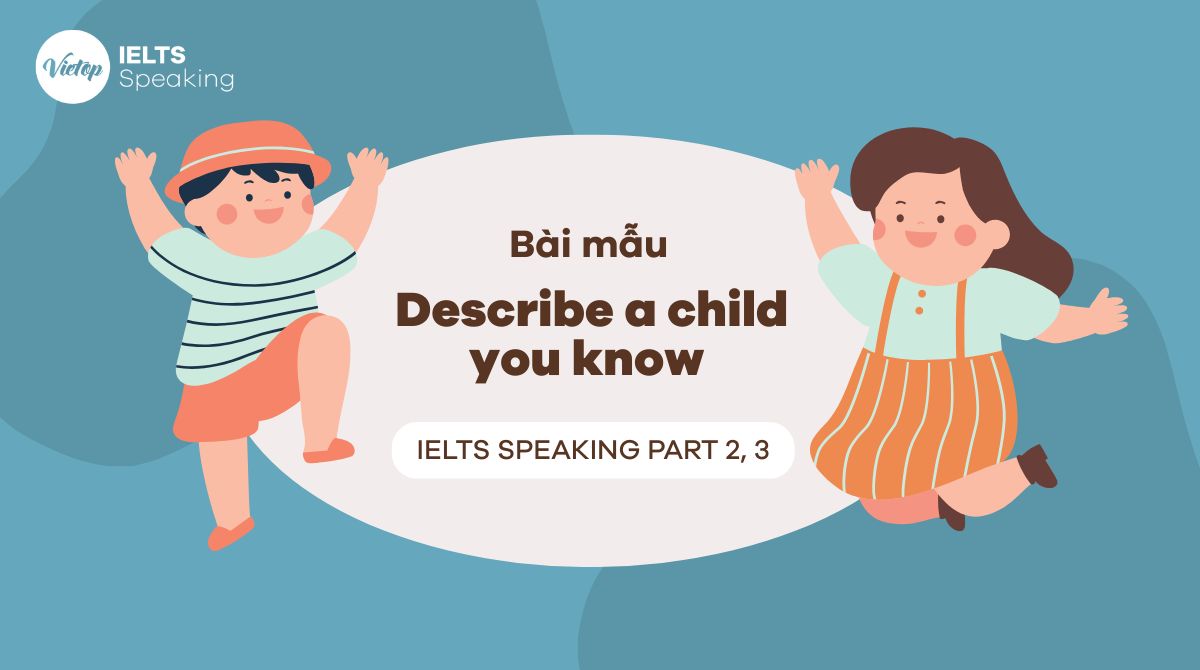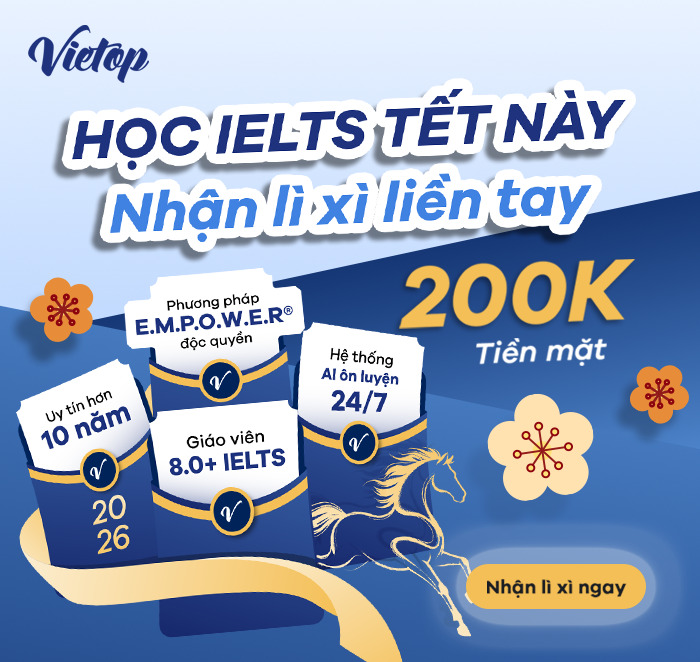Với bài viết hôm nay, Vietop mời các bạn cùng tham khảo qua phần bài mẫu topic Culture IELTS Speaking Part 1, 2, 3 – văn hóa. Đây là một chủ đề khá khó trong phần IELTS Speaking nên chúng ta hãy cùng chú ý tham khảo kỹ nhé!
Từ vựng thường gặp về topic Culture
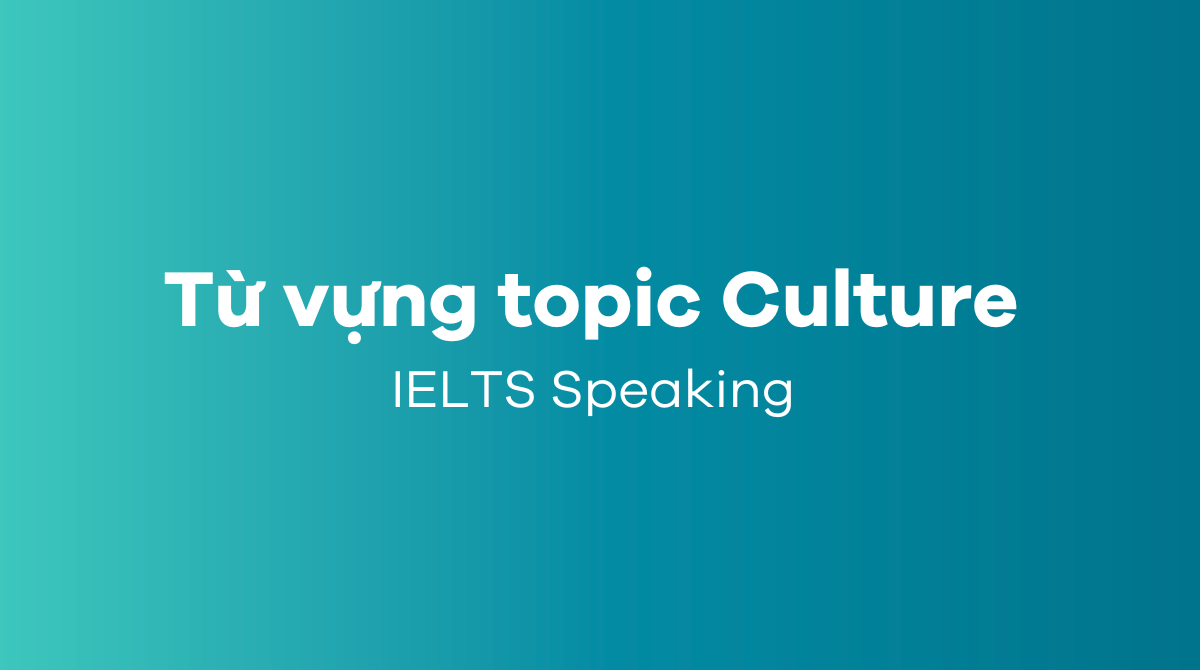
| Từ vựng | IPA | Ý nghĩa |
| A diversified culture | ə daɪˈvɜːsɪfaɪd ˈkʌlʧə | Nền văn hoá đa dạng |
| Acculturation | ə.ˌkʌl.t͡ʃə.ˈɹeɪ.ʃən | Sự tiếp nhận và biến đổi văn hóa |
| Ceremonies | ˈsɛrɪməniz | Nghi lễ |
| Civilization | ˌsɪvɪlaɪˈzeɪʃən | Nền văn minh |
| Civilize something | ˈsɪvɪlaɪz ˈsʌmθɪŋ | Khai sáng thứ gì đó |
| Conformity | kənˈfɔːmɪti | Sự phù hợp |
| Contemporary culture / modern culture | kənˈtɛmpərəri ˈkʌlʧə / ˈmɒdən ˈkʌlʧə | Văn hoá đương đại |
| Cultural | ˈkʌlʧərəl | Thuộc văn hóa |
| Cultural assimilation | ˈkʌlʧərəl əˌsɪmɪˈleɪʃ(ə)n | Sự đồng hoá văn hoá |
| Cultural degradation | ˈkʌlʧərəl ˌdɛgrəˈdeɪʃən | Sự xói mòn về mặt văn hoá |
| Cultural diversity | ˈkʌlʧərəl daɪˈvɜːsɪti | Sự đa dạng về văn hóa |
| Cultural exchange | ˈkʌlʧərəl ɪksˈʧeɪnʤ | Trao đổi văn hoá |
| Cultural festival | ˈkʌlʧərəl ˈfɛstəvəl | Lễ hội văn hoá |
| Cultural globalization | ˈkʌlʧərəl ˌgləʊb(ə)laɪˈzeɪʃ(ə)n | Toàn cầu hoá văn hoá |
| Cultural heritage | ˈkʌlʧərəl ˈhɛrɪtɪʤ | Di sản văn hóa |
| Cultural integration | ˈkʌlʧərəl ˌɪntɪˈgreɪʃən | Sự hội nhập văn hoá |
| Cultural norms | ˈkʌlʧərəl nɔːmz | Chuẩn mực văn hóa |
| Cultural richness/ cultural diversity | ˈkʌlʧərəl ˈrɪʧnɪs/ ˈkʌlʧərəl daɪˈvɜːsɪti | Sự đa dạng văn hoá |
| Cultural specificity | ˈkʌlʧərəl ˌspɛsəˈfɪsɪti | Nét đặc trưng văn hoá |
| Cultural traditions | ˈkʌlʧərəl trəˈdɪʃənz | Văn hóa truyền thống |
| Cultural uniqueness | ˈkʌlʧərəl juːˈniːknəs | Nét văn hoá đặc sắc |
| Culturally | ˈkʌlʧərəli | Về phương diện văn hóa |
| Culture | ˈkʌlʧə | Văn hóa |
| Culture diffusion | ˈkʌlʧə dɪˈfjuːʒən | Truyền bá văn hóa |
| Culture shock | ˈkʌlʧə ʃɒk | Sốc văn hoá |
| Cultured = well-educated, well-read, intelligent, polite | ˈkʌlʧəd = wɛl-ˈɛʤu(ː)keɪtɪd, wɛl-riːd, ɪnˈtɛlɪʤənt, pəˈlaɪt | Người có văn hóa |
| Currency | ˈkʌrənsi | Tiền tệ |
| Deep-rooted culture | ˈdiːpˈruːtɪd ˈkʌlʧə | Văn hoá bám sâu vào cội rễ |
| Discrimination | dɪsˌkrɪmɪˈneɪʃən | Phân biệt đối xử |
| Exotic culture | ɪgˈzɒtɪk ˈkʌlʧə | Văn hoá nước ngoài xâm nhập, văn hoá ngoại lai |
| Fine art | faɪn ɑːt | Nghệ thuật |
| Folk culture | fəʊk ˈkʌlʧə | Văn hoá dân gian |
| Folklore | ˈfəʊklɔː | Tập quán |
| Global | ˈgləʊbəl | Toàn cầu |
| Globalisation | ˌgləʊb(ə)laɪˈzeɪʃ(ə)n | Toàn cầu hóa |
| Heritage | ˈhɛrɪtɪʤ | Di sản |
| Historic site | hɪsˈtɒrɪk saɪt | Di tích lịch sử |
| Indigenous culture | ɪnˈdɪʤɪnəs ˈkʌlʧə | Văn hoá bản địa |
| Lingua franca | ˈlɪŋgwə ˈfræŋkə | Một ngôn ngữ phổ biến được sử dụng bởi những người nói các ngôn ngữ khác nhau như tiếng mẹ đẻ của họ |
| Linguistic | lɪŋˈgwɪstɪk | Thuộc về ngôn ngữ |
| Local culture | ˈləʊkəl ˈkʌlʧə | Văn hoá địa phương |
| Melting-pot society / multi-cultural society | ˈmɛltɪŋˈpɒt səˈsaɪəti / ˈmʌltɪ-ˈkʌlʧərəl səˈsaɪəti | Xã hội đa văn hoá, đa sắc tộc |
| Multicultural | ˌmʌltɪˈkʌlʧərəl | Đa văn hóa |
| Mythology | mɪˈθɒləʤi | Thần thoại |
| National culture legacy | ˈnæʃənl ˈkʌlʧə ˈlɛgəsi | Di sản văn hoá quốc gia |
| National identity | ˈnæʃənl aɪˈdɛntɪti | Bản sắc dân tộc |
| Prejudice | ˈprɛʤʊdɪs | Định kiến (thiên về cảm xúc) |
| Race conflict | reɪs ˈkɒnflɪkt | Xung đột sắc tộc |
| Racism | ˈreɪsɪzm | Chủ nghĩa phân biệt chủng tộc |
| Ritual | ˈrɪʧʊəl | Lễ nghi |
| Segregation | ˌsɛgrɪˈgeɪʃən | Phân chia (chủng tộc, giới tính,…) |
| Show prejudice (against sb/st) | ʃəʊ ˈprɛʤʊdɪs (əˈgɛnst) | Thể hiện định kiến với ai/cái gì |
| Social culture | ˈsəʊʃəl ˈkʌlʧə | Văn hoá xã hội |
| Stereotype | ˈstɪərɪətaɪp | Định kiến (theo tư tưởng) |
| Values | ˈvæljuːz | Giá trị |
Xem thêm:
Bài mẫu topic Culture IELTS Speaking part 1
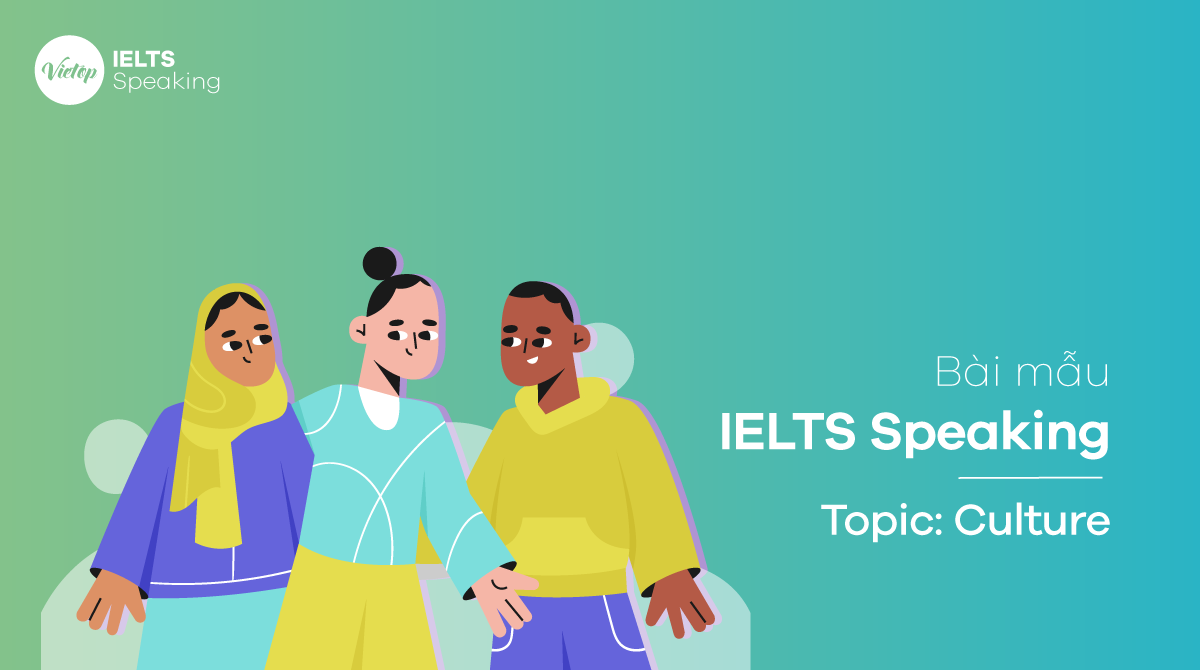
Mời mọi người nghe Audio Topic Culture Part 1 tại đây nhé!
1. What is the most important festival in your country?
The most important, in my opinion, is the Tet Holiday, which is similar to Christmas in Western countries. It occurs on January 1st, according to the lunar calendar, it holds significant meaning as it’s the moment when the old year is over and the new year is celebrated. We also have about ten days off during this festival.
- To occur (v): diễn ra
- The lunar calendar (n): âm lịch
- Significant (adj): đặc trưng
- Moment (n): khoảnh khắc
- Day off (n): ngày nghỉ
2. Do you think this festival will still be as important in the future?
Yes, I believe that despite how our lives are changing, Tet will continue to be an essential traditional festival in my country because it is more like a time for reunions, to reflect on what has happened and prepare for new beginnings, and most importantly, an occasion to enjoy ourselves, recharge our batteries and cherish the most valuable things in life.
- Essential (adj): quan trọng
- Reunion (n): tụ hội, đoàn tụ
- To reflect (v): chiếu lại, nghĩ lại
- Beginning (n): sự bắt đầu
- To recharge one’s battery (v): “sạc” lại năng lượng
- To cherish (v): quý mến, trân trọng
Xem ngay: Khóa học IELTS Online – Online trực tuyến cùng chuyên gia IELTS 8.5
3. Do you think that there should be more holidays in your country?
Since people now lead a fast-paced and stressful lifestyle, I suppose more national days off from work would be required. However, I am still unable to come up with another legitimate Vietnamese official holiday.
- Fast-paced (adj): nhanh
- To come up with (v): nghĩ ra
- Legitimate (adj): chính đáng, hợp lý
4. What holiday or festival has become more popular in Vietnam recently?
In recent years, due to the emergence of exotic culture, holidays like Christmas and Valentine’s Day have grown in popularity. However, I would argue that these holidays and festivals are more commercialized because businesspeople put a lot of work into gaining more clients well in advance of these holidays. Anyway, regardless of religion or anything else, Vietnamese people always want to take advantage of this chance to unwind and have fun.
- Emergence (n): sự xuất hiện
- Exotic culture (n): văn hóa ngoại lai
- To be commercialized (v): được thương mại hóa
- Businesspeople (n): doanh nhân
- Regardless: mặc cho, mặc dù, kể cả
- Religion (n): tôn giáo
- To unwind (v): nghỉ ngơi thư giãn
Tham khảo:
Bài mẫu topic Environment IELTS Speaking Part 1, 2 & 3
Bài mẫu topic Culture IELTS Speaking part 2
Mời mọi người nghe Audio Topic Culture Part 2 tại đây nhé!
Describe a foreign culture that you are interested in.
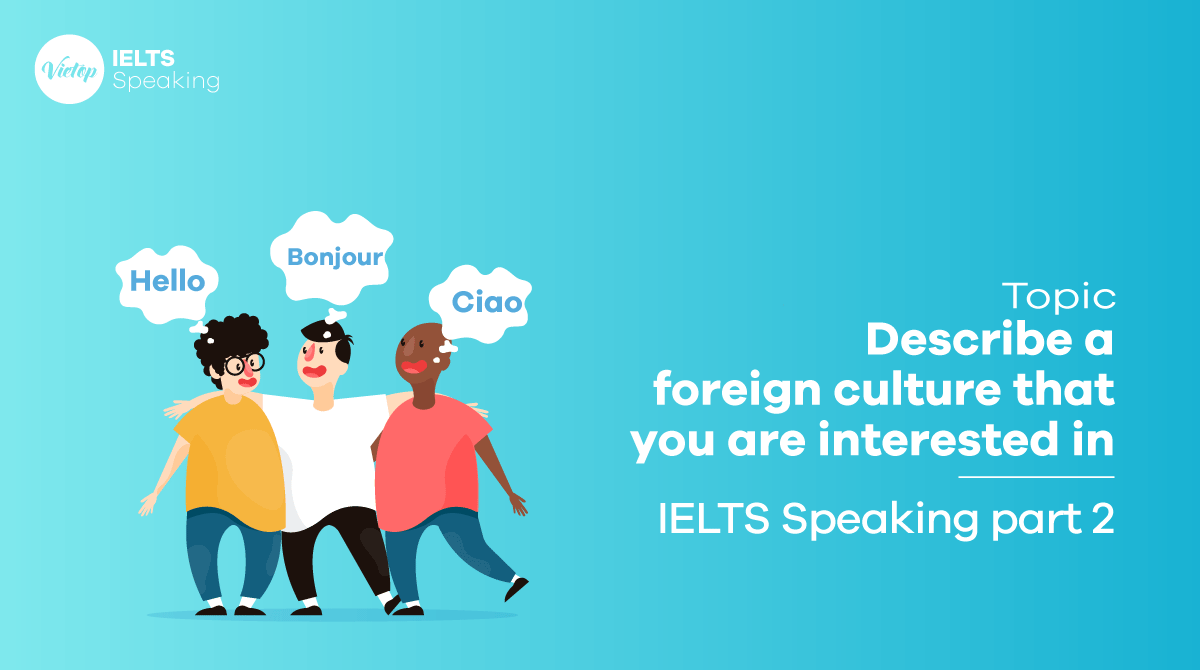
You should say
- what this culture is
- how you learned about this culture
- what you know about this culture and explain why you feel this culture is interesting.
When mentioning a culture that I find interesting, I would like to talk about the culture of France, or Paris particularly. The western culture of this hexagonal country’s capital has had a profound influence on modern Vietnamese culture, due to more than 100 years of colonization. However, I only experienced the “real” French culture when I had a trip to Paris last year.
The food, especially the bread, is the first thing that springs to mind when I think about Paris. I appreciate how most Parisians buy fresh baguettes every morning, usually from little local bakeries or “patisseries”. It makes a nice break from the loaves of sliced bread from the supermarket, this is quite similar in Vietnam, however, we usually don’t eat bread, or “banh mi” every day. Moreover, Parisians don’t appear to form friendships with their coworkers to the same degree as we Vietnamese do here, which is one slightly unfavourable difference I observed there.
One last thing to notice is the café culture in Paris. You can always find an interesting place to sit down, enjoy a cup of coffee, catch up with friends, or just watch life as it happens. In fact, I developed the habit of ordering a croissant or a cake at every beautiful café I came across. I appreciate this culture because, if you look closely enough, you can detect similarities between modern Vietnamese and contemporary Parisian culture.
- Hexagonal country (n): đất nước hình lục giác (chỉ nước Pháp)
- A profound influence (n): ảnh hưởng sâu sắc
- Colonization (n): thuộc địa
- Baguette (n): bánh mì Pháp
- To make a nice break from: khác hẳn với
- To the same degree as: giống như
- An unfavourable difference (n): một sự khác biệt bất lợi
- To catch up with friends (v): trò chuyện với bạn bè
- To develop the habit (v): hình thành thói quen
- To look closely (v): nhìn kỹ, để ý kỹ
- To detect (v): nhận ra, tìm ra
- Similarity (n): sự giống nhau
- Contemporary (adj): đương thời
Tham khảo:
Bài mẫu Topic Culture IELTS Speaking part 3
Mời mọi người nghe Audio Topic Culture Part 3 tại đây nhé!
1. Do you think it’s important to know about other cultures?
Yes, I really believe that becoming familiar with other cultures is quite crucial. Not only can you learn fascinating things about them, but it also makes it simpler for you to get along with the people of those cultures whenever you have a chance to interact with them. Additionally, understanding a culture would make doing business much simpler, I think.
- Crucial (adj): quan trọng
- Fascinating (adj): thú vị
- To interact (v): tương tác
- Additionally (adv): thêm vào đó
- To do business (v): kinh doanh
Luyện tập IELTS Speaking với bài mẫu IELTS Speaking part 2 và IELTS Speaking part 3 nhé!
2. What do you think is the best way to learn about foreign cultures?
I believe that learning a foreign language is the finest approach to gaining knowledge of a nation’s culture. Even when I don’t succeed in mastering the languages I’m learning, I find that I am exposed to common mythical stories, history, literature, poems, and songs, in other words, those which constitute the culture in which the language is spoken. This is because whenever I learn a foreign language, I always have a sudden, unexplainable interest in its culture.
- Finest (adj): tốt nhất
- Approach (n): cách tiếp cận
- To be exposed to (v): được tiếp xúc với
- To constitute (v): cấu thành, hình thành
- Unexplainable (adj): không giải thích được
3. Do you think it’s better to go overseas to study a foreign language or to study it in your home country?
Obviously. In my opinion, when you learn a language where it is spoken, you are compelled to use the language outside of the classroom and are immersed in it. Otherwise, you only come into contact with the language while studying. I can attest that it is simple to forget what you have learnt when learning a foreign language in your native country.
- Obviously: hoàn toàn, dĩ nhiên
- To be compelled to (v): bắt buộc phải
- To be immersed in (v): đằm mình, hòa mình vào
- Otherwise: nếu không thì
- To attest (v): chứng minh, chứng thực
Xem thêm:
Bài mẫu topic Name IELTS Speaking part 1
Cách trả lời IELTS Speaking Part 3 trong các tình huống khó
Talk about your best friend – Bài mẫu và từ vựng IELTS Speaking part 1, 2, 3
Trên đây là từ vựng và bài mẫu topic Culture IELTS Speaking part 1, 2, 3 – văn hóa. Vietop hy vọng đã có thể giúp các bạn tham khảo được thêm nhiều từ vựng và ý tưởng để chuẩn bị tốt hơn cho chủ đề phức tạp này. Chúc các bạn luyện thi IELTS tốt!

